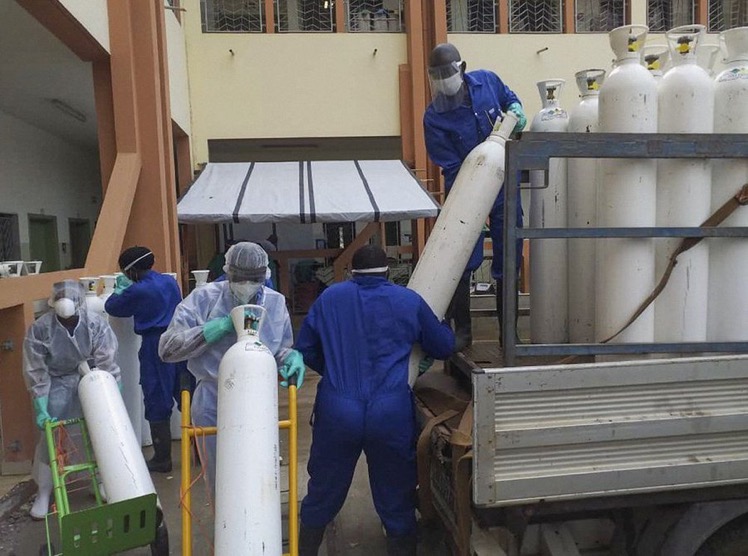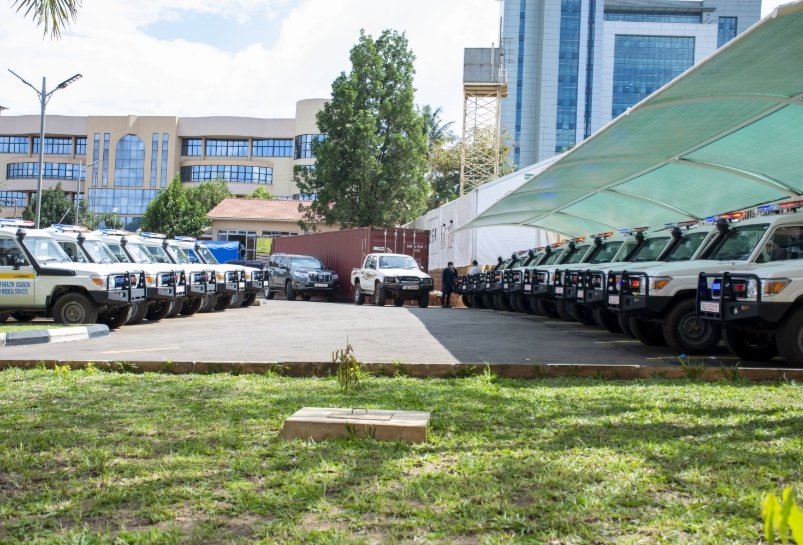As the Covid-19 pandemic pushed fragile economies into a chokehold, it exposed a window of malfeasance in Uganda where tenders became the jet fuel for graft.
According to an internal government audit by the Ministry of Finance, Planning and Economic Development, titled: ‘Covid-19 interventions report,’ there is evidence to suggest that the award of lucrative deals was peppered with influence peddling and the purchase of vital medical equipment was inflated.
Whereas lenders such as the International Monetary Fund (IMF) and World Bank have demanded for stringent rules in the award of these lucrative tenders, most of the deals have been executed through opaque methods.
Amongst those fingered in the report is a company, M/s Silver Bucks Pharmacy Ltd, owned by the president’s-daughter-in law, Charlotte Kainerugaba who is a wife to Lt. Gen. Kainerugaba Muhoozi, the head of the Special Forces Command (SFC) and her sister, Ishta Asiimwe Muganga, both daughters of foreign affairs minister Sam Kutesa, also the president’s brother-in-law. The audit raises a query about this deal suggesting that the cost of oxygen plants could have been inflated after the company owned by the president’s in-laws had earlier on in 2017 supplied the same equipment for an extremely low price. For nearly the same amount of money, the company provided 13 oxygen plants four years ago and in 2020, the report claims it only promised to supply two.
M/s Silver Bucks Pharmacy Ltd was contracted to supply and install oxygen plants for Mulago and Entebbe hospitals at a cost of shs. 6.4 billion. It was also meant to supply 450 cylinders including regulators, humidifier bottles, and cannula among others.
The contract was signed on May 6, 2020 and provided a two-year warranty including spare parts. Although 100% of the invoice value of number R1658/MAY20/01 was paid by June 30, 2020 even though deliveries and installations had not commenced by September 2020.
“It is worth noting that the same supplier M/s Silver Backs installed oxygen plants in 13 Regional Referral Hospitals in 2017 at the same amount (cost) that the Government of Uganda is spending on only two oxygen plants today (Financial Year 2019/20). A contract was signed between M/s Silverbacks and Naguru Hospital to install 13 oxygen plants at a sum of US$ 1,800,347 in May 2016 (this translated into 6.0 billon at a then going exchange rate of shs 3,370,” reads the report.
But in a reply, M/S Silverbacks Pharmacy Ltd has denied any wrongdoing.
The company says that contrary to the audit, it was contracted to supply seven oxygen plants, not two.
“The seven are four oxygen plants for Mulago National Referral Hospital (three with a capacity of 30m3/hr each, and one with a capacity of 35m3/hr); one Oxygen plant with a 16m3/hr capacity at Entebbe Grade B Hospital; one with a capacity of 11 m3/hr at Mbarara Regional Referral Hospital; and another at Kayunga Hospital, also with the capacity of 11 m3/hr.”
“This procurement also included three filling stations, 450 cylinders, 450 regulators, humidifier bottles and cannulas at a cost of Uganda Shillings 6.4 Billion,” the company revealed.
The company also denied peddling influence to win the deal.
“Silverbacks emerged the best evaluated bidder for Procurement Reference Number MHC/SERVICES/19-20/00098,” the statement further read, “As part of the Covid-19 national response, Ministry of Health (MOH) issued a Request for Quotations to which Silverbacks Pharmacy responded. MOH then contracted Silverbacks Pharmacy under Procurement Reference MOH/SUPLS/19-20/137 to supply and install 7 medical oxygen plants.”

Addressing the claims of an inflated contract sum, Silverbacks Pharmacy Ltd explained the differences between the items supplied in 2017 and what was delivered in 2020, and blamed other factors for the price changes.
“These procurements differed in specifications of plant size and works. In 2020 the price disparity is brought about by the following; additional items procured in 2020; that is (450 cylinders, 450 regulators and accessories), air freight due to the emergency nature of the procurement, exchange rate difference between 2017 and 2020,” reads the statement.
Other high-profile beneficiaries include the minister for Gender, Labour and Social Development, Frank Kagyigyi Tumwebaze whose Emburara Safari Limited trading as Nyumbani Hotel, served as an isolation centre for Covid-19 patients and those returning from abroad. There is no evidence to suggest that Tumwebaze used his influence to get this deal.
The report has since been shelved after a backlash from the Health ministry and others accused.
The report also shows an inept leadership whose actions and dereliction from duty could have constructively led to deaths of patients who were starved off vital equipment like ventilators and oxygen.
A few privileged patients including high-profile government officials continue to access the best facilities for treatment while the underclass who are the majority can only find a crowded pocket in Uganda’s ailing hospitals where they usually stare at death as supplies such as oxygen are scarce.
The report released towards the end of last year cites glaring mistakes and delayed procurement for vital equipment, such as ambulances and the installation of Intensive Care Unit (ICU) equipment, which could have perhaps led to the reduction in deaths.
“The planned 38 ambulances were still under procurement. M/s AutoZone Armour Processing Cars L.L.C through M/s City Ambulance Limited was contracted to supply the ambulances at shs 11bn. All funds (100%) were uploaded onto a letter of credit at Bank of Uganda by 30th June 2020,” reads part of the audit. It was agreed that payments to the service provider will be done upon delivery. However, ‘the initial delivery date was 30th July 2020, this was not achieved by September 2020 and extended to November 2020.”

The Health ministry was allocated a supplementary amount of shs. 42.3 billion for procurement and installation of emergency Intensive Care Unit (ICU) equipment in regional referral hospitals. A number of contracts were signed in this regard.
“These were M/S Elsmeed EA Ltd which was contracted to supply equipment worth shs 26 billion on 18th June 2020. Initial deliveries were expected in August 2020, however due to high demand of the same equipment internationally, delivery period was extended to December 2020,” the report reads partly.
According to the audit, the supplier was expected to supply 1,553 units of equipment to 17 regional Referral Hospitals. These included defibrillators, suction and infusion pumps, nebulizers, mobile x-rays, oxygen concentrators, weighing scales, portable ultrasounds, patient trolleys, ventilators and ICU beds among others.
Another contract was given to the Joint Medical Stores (JMS) to procure ICU equipment worth shs 10.5 billion on May 24, 2020. The JMS was expected to deliver 388 pieces of ICU equipment comprised of 28% ventilators, 25% patient monitors, 24% oxygen therapy apparatus, while the rest (22%) were ICU beds. The equipment was expected to be delivered in six weeks.
“This was not achieved by 30th June 2020, however JMS had delivered equipment to six hospitals; Naguru, Entebbe, Jinja, Mbale, Lacor and Lira. Other hospitals had not received the equipment by 2nd September 2020. Deliveries and installations were expected to be completed by December 2020. It was noted that some hospitals like Gulu and Arua Regional Referral hospitals did not have adequate space for the ICU equipment.
Another contract for megaphones worth shs 2.9 billion was signed on 11th May 2020. The procurement included 108,863 megaphones at a unit cost of shs 230,000 and 43,450 pieces of dry cells at shs 10,000 each. These were expected to facilitate communication of COVID-19 messages in all parishes. The megaphones were delivered on 22nd June 2020, however, districts visited by the monitoring team in July, August and September had not received these items. These included; Oyam, Omoro, Apac, Agago, Gomba and Butambala among others.
The Health ministry also signed three contracts with M/S JMS worth shs 1.3billion to supply 1,000 beds and mattresses, 2,000 blankets and 2,000 bed sheets and shs 1billion, 282 and 103million respectively. The unit cost of each bed was shs 890,000 and shs 119,491 for a mattress covered with PVC.
“The JMS supplied 2,000 single size bed sheets at a cost of shs 51,500 on 23rd June 2020. All the beds and mattresses were reportedly delivered. The monitoring team verified delivery of only 331 beds and mattresses. The list of the rest of the beds was not availed to the monitoring team. Although over 300 beds were moved from Namboole (Quarantine Centre then) to Mulago Hospital, the latter acknowledged receipt of only 290 instead of the 300 beds,” reads the report.
M/S Global Centre Limited also supplied 2,000 single size bed sheets with each costing shs 51, 500. Deliveries were made on 23rd June 2020, and a total of shs 103 million paid to the supplier.
Sleeper tents worth shs 3.8billion were procured from M/s Lumious Uganda Limited. Each of the 100 capacity tents was procured at a sum of shs 163million. Although the contract stipulated 20 tents, only 13 were signed and installed at Namboole by time of monitoring in September 2020. All the tents procured failed and could not be used to accommodate patients as earlier anticipated due to their weak specifications and capacity. The users and stakeholders at Namboole questioned the suitability and quality of tents procured by the Health ministry.
The health ministry accommodated over 2,500 COVID-19 suspects and returnees in various institutions by August 2020. These included: Fisheries Training Institute, Diary Development Authority (DDA) Training Institute, Institute of Surveys and Land Management, National Metrological Training School among others. Others were accommodated hotels like Grand Global Hotel Ltd, Central INN Hotel Ltd, Emburara Safari Limited trading as Nyumbani Hotel; Kirigime Guest House among others. The unit cost of full accommodation varied from shs 60,000 to shs 250,000. Although there was a guideline that travellers from abroad should cater for their accommodation costs, the Health ministry incurred costs for a number of people. The selection criteria regarding the beneficiaries of these services remained unclear.
The report indicates that there was inefficiency in utilisation of COVID-19 funds by Regional Referral Hospitals characterised by varying unit costs of food served to COVID-19 patients, mischarges, lack of accountabilities, duplicated activity reports, doubtful burials of COVID-19 cases, and domestic arrears for hospitals like Gulu and Arua among others. By 17th August, Arua Regional Referral Hospital had accumulated arrears of shs 278million on food, refreshments, allowance, and accommodation of health workers.
Arua Regional Referral Hospital hired M/s Family Investment Uganda Limited, dealers in phone selling, phone charging MTN services, construction, revenue collection, whole sale and deport services to undertake patient referrals, collection of suspects, trace contracts. Details of procurement of ABS firm could not be traced by 17th August 2020.







